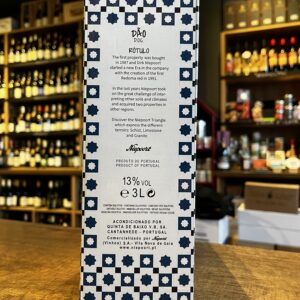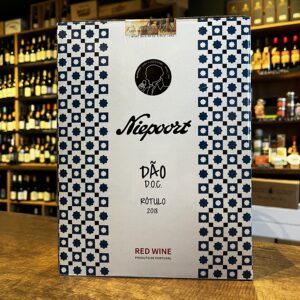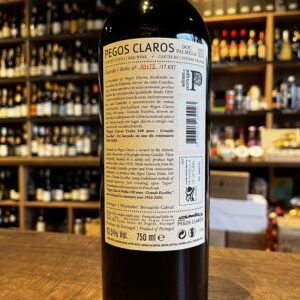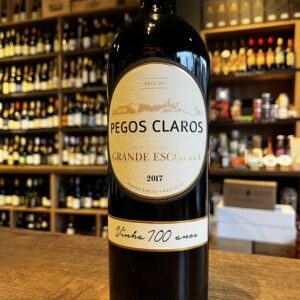-
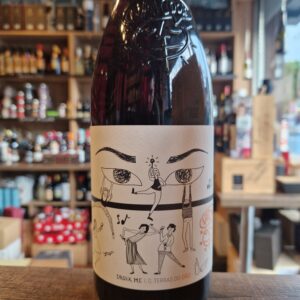 Nat Cool is an innovative, naturally “cool and funky” concept initiated by Niepoort in the Vinho Verde wine region. The movement later expanded into Bairrada and the Douro Valley and is now represented in various Portuguese as well as international wine regions. Nat Cool is not just about producing low-intervention wines – it embodies a movement uniting many different producers striving towards a shared goal of crafting uncomplicated, light and easy-to-drink wines. In 2020, the Nat Cool “family” grew, with its foray into Portugal’s Dão region. It is here, on the slopes of the Serra da Estrela Mountain Range that the DrinkMe Nat Cool is created and where we explore the region’s potential for elegant, fresh and straight-forward wines. Pair it with Light and simple dishes as well as comfort food
Nat Cool is an innovative, naturally “cool and funky” concept initiated by Niepoort in the Vinho Verde wine region. The movement later expanded into Bairrada and the Douro Valley and is now represented in various Portuguese as well as international wine regions. Nat Cool is not just about producing low-intervention wines – it embodies a movement uniting many different producers striving towards a shared goal of crafting uncomplicated, light and easy-to-drink wines. In 2020, the Nat Cool “family” grew, with its foray into Portugal’s Dão region. It is here, on the slopes of the Serra da Estrela Mountain Range that the DrinkMe Nat Cool is created and where we explore the region’s potential for elegant, fresh and straight-forward wines. Pair it with Light and simple dishes as well as comfort food -
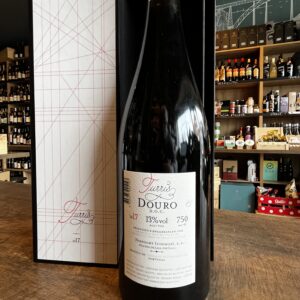
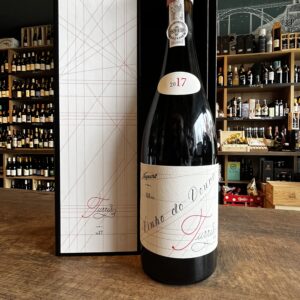 Turris is Niepoort's flagship red wine from the Cima Corgo region, more specifically from a very old South-facing vineyard whose vines are more than 130 years old , it is one of the oldest vineyards we know of in the region. This truly ancient, uncultivated vineyard lies hidden in the heart of the Douro Valley and is a true gift from our ancestors and refelcts every detail of nature and its area. These grapes from the Torre were always intended for one of Niepoort top wine Batuta and were a dream come true from Dirk Niepoort. The Turris was bottled quite early to preserve its freshness, minerality, youthful nature and the purity of its aromas and we expect it to show great aging potential. In addition to being a unique wine, each bottle is also unique because the labels were individually designed by the artist João Noutel.
Turris is Niepoort's flagship red wine from the Cima Corgo region, more specifically from a very old South-facing vineyard whose vines are more than 130 years old , it is one of the oldest vineyards we know of in the region. This truly ancient, uncultivated vineyard lies hidden in the heart of the Douro Valley and is a true gift from our ancestors and refelcts every detail of nature and its area. These grapes from the Torre were always intended for one of Niepoort top wine Batuta and were a dream come true from Dirk Niepoort. The Turris was bottled quite early to preserve its freshness, minerality, youthful nature and the purity of its aromas and we expect it to show great aging potential. In addition to being a unique wine, each bottle is also unique because the labels were individually designed by the artist João Noutel. -
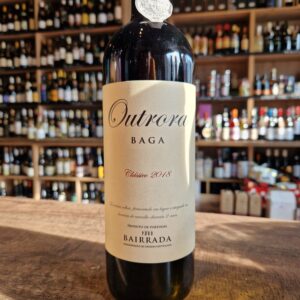 This Bairrada Classic wine is a tribute to the centenary vineyards, matriarchs of the region and witnesses of past times. The grapes are selected from 80 to 120 year old vines from our vineyard in the Cadoiços Valley. Winemaking in “lagar” with foot treading, besides being an old technique, we believe it remains the best way to obtain great wines of this variety. The two-year oak stage and subsequent bottle rest give the elegance and balance needed for a wine to be tasted for many years. An Impressive Bairrada!An Impressive Wine! Goes well with buttered Goat and Sheep Cheeses, traditional sausages (raw, boiled, or roasted), red meats
This Bairrada Classic wine is a tribute to the centenary vineyards, matriarchs of the region and witnesses of past times. The grapes are selected from 80 to 120 year old vines from our vineyard in the Cadoiços Valley. Winemaking in “lagar” with foot treading, besides being an old technique, we believe it remains the best way to obtain great wines of this variety. The two-year oak stage and subsequent bottle rest give the elegance and balance needed for a wine to be tasted for many years. An Impressive Bairrada!An Impressive Wine! Goes well with buttered Goat and Sheep Cheeses, traditional sausages (raw, boiled, or roasted), red meats -
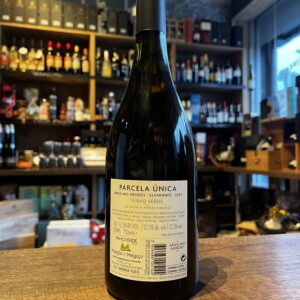
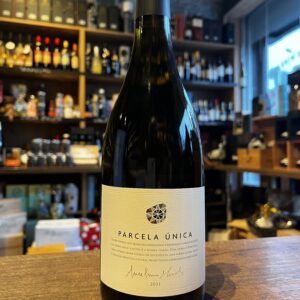 Born in Monção in Portugal’s Vinho Verde region, Anselmo Mendes fell in love with the Alvarinho grape at an early age and began making his first wines from the variety in 1988. Over the years he has consulted for many of Portugal’s top wineries and he also makes his own wines in Minho close to the border with Spain. Anselmo uses his decades of experience of working with Alvarinho to create a range of styles from crisp, light-bodied expressions to richer wines which are fermented and aged in oak barrels. A very versatile wine, it can be paired with stronger meat dishes or more complex fish, as well as shellfish and crustaceans. In the company of almond crusted cod on a bed of mashed potatoes or lamb chops with rosemary, Parcela Única wine in perfect harmony enhances fantastic flavors. Should be served between 11-13ºC. Technical sheet
Born in Monção in Portugal’s Vinho Verde region, Anselmo Mendes fell in love with the Alvarinho grape at an early age and began making his first wines from the variety in 1988. Over the years he has consulted for many of Portugal’s top wineries and he also makes his own wines in Minho close to the border with Spain. Anselmo uses his decades of experience of working with Alvarinho to create a range of styles from crisp, light-bodied expressions to richer wines which are fermented and aged in oak barrels. A very versatile wine, it can be paired with stronger meat dishes or more complex fish, as well as shellfish and crustaceans. In the company of almond crusted cod on a bed of mashed potatoes or lamb chops with rosemary, Parcela Única wine in perfect harmony enhances fantastic flavors. Should be served between 11-13ºC. Technical sheet -
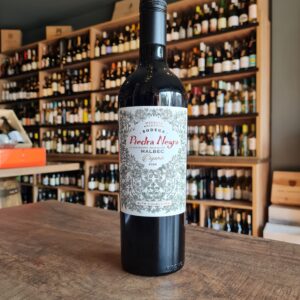 François Lurton vineyards are situated in the highlands (1,100 m) and semi-desert (poor alluvial gravels reminiscent of those of Pessac-Léognan), in the plains at the foot of the mountain range of the Andes: the Uco Valley. Thanks to his experience, acquired all over the world, he practices an environmentally friendly viticulture and produces extraordinary wines here that have a unique personality that combines freshness and concentration. Thanks to the climatic conditions of this high altitude desert and very draining and not very fertile alluvial gravel soils, the wines of the Uco Valley, and especially those of Los Chacayes, are quite unique and François Lurton vision was a success. This Malbec has a an outstanding quality/price ratio and it is definitely a contender not only for those summer barbecues but also for those cold winter nights. Pair it with Carpaccio, Paella, Iberian ham, red pepper stuffed with cheese and Hummus.
François Lurton vineyards are situated in the highlands (1,100 m) and semi-desert (poor alluvial gravels reminiscent of those of Pessac-Léognan), in the plains at the foot of the mountain range of the Andes: the Uco Valley. Thanks to his experience, acquired all over the world, he practices an environmentally friendly viticulture and produces extraordinary wines here that have a unique personality that combines freshness and concentration. Thanks to the climatic conditions of this high altitude desert and very draining and not very fertile alluvial gravel soils, the wines of the Uco Valley, and especially those of Los Chacayes, are quite unique and François Lurton vision was a success. This Malbec has a an outstanding quality/price ratio and it is definitely a contender not only for those summer barbecues but also for those cold winter nights. Pair it with Carpaccio, Paella, Iberian ham, red pepper stuffed with cheese and Hummus. -
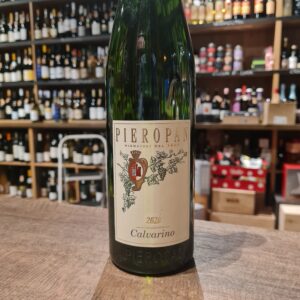 The history of this brand dates back to 1880, when this business was established in the Soave village in the reputed zone of Palazzo Pullici in Italy. Leonildo Pieropan, a physician from Soave, was well-aware of the potential of the soils in this region, because of his previous work experience in the family vineyards. He, along with his sons, Fausto and Gustavo, started working in the cellars in the 1950s and 60s to churn out impeccable quality, Italian wines that spoke a lot about the quality of their terroirs. Today, this business is run by the fifth generation of the Pieropan family, with the same dedication and winemaking philosophy. The Pieropan family believes in traditional winemaking principles. These are reflected in the way they maintain their vineyards. The local territory of these vineyards is given utmost importance and minimalistic intervention technique is followed in addition to organic viticultural practices. The three vineyards from where grapes are sourced for Pieropan wines are Calvarino, La Rocca and Garzon. Calvarino vineyard is the oldest of the three as it has been with the family since 1901. It is located right in the heart of the Soave area and is blessed with amazingly rich and fertile volcanic soils. It makes an excellent aperitif and partners a wide range of dishes, especially vegetable quiches, delicately-flavoured fish, shellfish and cheese soufflés
The history of this brand dates back to 1880, when this business was established in the Soave village in the reputed zone of Palazzo Pullici in Italy. Leonildo Pieropan, a physician from Soave, was well-aware of the potential of the soils in this region, because of his previous work experience in the family vineyards. He, along with his sons, Fausto and Gustavo, started working in the cellars in the 1950s and 60s to churn out impeccable quality, Italian wines that spoke a lot about the quality of their terroirs. Today, this business is run by the fifth generation of the Pieropan family, with the same dedication and winemaking philosophy. The Pieropan family believes in traditional winemaking principles. These are reflected in the way they maintain their vineyards. The local territory of these vineyards is given utmost importance and minimalistic intervention technique is followed in addition to organic viticultural practices. The three vineyards from where grapes are sourced for Pieropan wines are Calvarino, La Rocca and Garzon. Calvarino vineyard is the oldest of the three as it has been with the family since 1901. It is located right in the heart of the Soave area and is blessed with amazingly rich and fertile volcanic soils. It makes an excellent aperitif and partners a wide range of dishes, especially vegetable quiches, delicately-flavoured fish, shellfish and cheese soufflés -
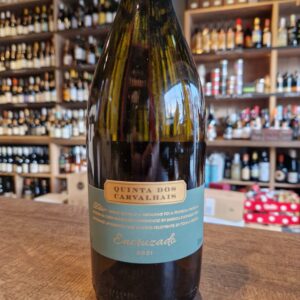 Sogrape Vinhos was founded in 1942 by Fernando van Zeller Guedes, with the ambition of making Portuguese wines known to the world and a long-term vision based on the quality of the wines to be marketed, the importance of the novelty of the brands, and the presentation of its wines. Today, led by the third generation of the founding family, Sogrape Vinhos is increasingly faithful to the goal it has had since it was founded: to be a family-owned company with an international vocation, focused on the production of quality wines, on innovation, and the development of global Portuguese brands. Sogrape Vinhos has about 830 hectares of vineyards in Portugal. Quinta dos Carvalhais is located in the municipality of Mangualde, near Nelas and Alcafache. The soil, the climate, the experience of those who have always produced wine make the Dão truly special. This 105-hectare estate, situated at an altitude of 465-500 metres, has 50 hectares under vine on predominantly granite soils. Warm days and cool nights at this altitude slow down the grape ripening process and result in wines with lovely depth yet vibrant fruit and a signature freshness. Precision viticulture is carried out on the estate with a multitude of different plots matched to specific grape varieties and harvested at different times. The fruit for the 2021 Encruzado was sourced from four different plots. Two cooler plots, one next to the lake on the estate and another often shaded by the oak trees, deliver a vibrant acidity the blend. Another plot with more sandy soils produces intensely aromatic grapes. All of the vineyards are farmed sustainably and harvesting is carried out by hand.
Sogrape Vinhos was founded in 1942 by Fernando van Zeller Guedes, with the ambition of making Portuguese wines known to the world and a long-term vision based on the quality of the wines to be marketed, the importance of the novelty of the brands, and the presentation of its wines. Today, led by the third generation of the founding family, Sogrape Vinhos is increasingly faithful to the goal it has had since it was founded: to be a family-owned company with an international vocation, focused on the production of quality wines, on innovation, and the development of global Portuguese brands. Sogrape Vinhos has about 830 hectares of vineyards in Portugal. Quinta dos Carvalhais is located in the municipality of Mangualde, near Nelas and Alcafache. The soil, the climate, the experience of those who have always produced wine make the Dão truly special. This 105-hectare estate, situated at an altitude of 465-500 metres, has 50 hectares under vine on predominantly granite soils. Warm days and cool nights at this altitude slow down the grape ripening process and result in wines with lovely depth yet vibrant fruit and a signature freshness. Precision viticulture is carried out on the estate with a multitude of different plots matched to specific grape varieties and harvested at different times. The fruit for the 2021 Encruzado was sourced from four different plots. Two cooler plots, one next to the lake on the estate and another often shaded by the oak trees, deliver a vibrant acidity the blend. Another plot with more sandy soils produces intensely aromatic grapes. All of the vineyards are farmed sustainably and harvesting is carried out by hand. -
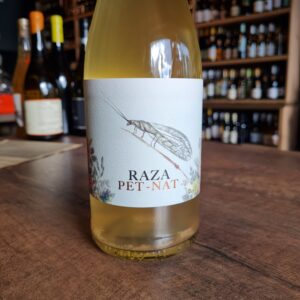 The concept of this label is to send the consumer to the botanical universe of the XVI century. A very unique style which is a tribute to nature and the living beings who look after it so well. A mixture of charcoal pencils with watercolor provides fresh, traditional, and natural air. The informative label on the side of the bottle is drawn in a vintage style referencing this era's aesthetics. The Lacewing or Chrysoperla (Raza)represents their holistic approach to viticulture. Its efficiency in biological control pest is remarkable and helps keep the vines free of pests.Pet Nat is an abbreviation for Pétillant Naturel, a naturally sparkling wine. The fermented wine is still bottled in the bottle, which stops the fermentation there, so a little CO2 and yeast precipitate is formed in the bottle. The wine is not cleaned, sweetened (no dosage) and the wine is now closed with a regular crown cap. The wine is made with natural yeast and uses minimal sulphites. Spontaneous fermentation ends in the bottle, as a result of which a pleasantly natural layer remains in the wine. This refreshing, sparkling wine is full of fruity and lively orchard flavors. The natural sediment makes the wine cloudy, while adding many interesting nuances to the taste, the wild yeast makes the wine tasty and easy to enjoy.
The concept of this label is to send the consumer to the botanical universe of the XVI century. A very unique style which is a tribute to nature and the living beings who look after it so well. A mixture of charcoal pencils with watercolor provides fresh, traditional, and natural air. The informative label on the side of the bottle is drawn in a vintage style referencing this era's aesthetics. The Lacewing or Chrysoperla (Raza)represents their holistic approach to viticulture. Its efficiency in biological control pest is remarkable and helps keep the vines free of pests.Pet Nat is an abbreviation for Pétillant Naturel, a naturally sparkling wine. The fermented wine is still bottled in the bottle, which stops the fermentation there, so a little CO2 and yeast precipitate is formed in the bottle. The wine is not cleaned, sweetened (no dosage) and the wine is now closed with a regular crown cap. The wine is made with natural yeast and uses minimal sulphites. Spontaneous fermentation ends in the bottle, as a result of which a pleasantly natural layer remains in the wine. This refreshing, sparkling wine is full of fruity and lively orchard flavors. The natural sediment makes the wine cloudy, while adding many interesting nuances to the taste, the wild yeast makes the wine tasty and easy to enjoy. -
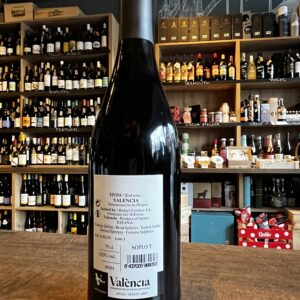
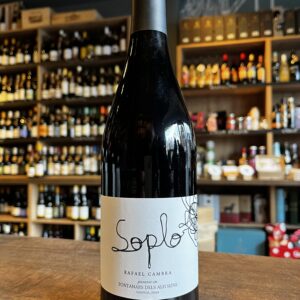 Rafael Cambra has spent most of his life in a vineyard. His family own one of the most prestigious nurseries in Spain, with clients like Vega Sicilia, Alvaro Palacios and many more. He established his own cellar in 2001 after finding a vineyard with 50-year-old Monastrell vines. He also planted some Cabernet Sauvignon and Cabernet Franc. The vineyards lie in the lowest part of the Sierra, inland from Valencia, with olive and almond trees surrounding them. Rafael believes in minimal intervention when it comes to wine-making, creating elegant yet restrained wines. He is an innovative wine-maker, constantly experimenting with different grapes and blends until completely satisfied with the result. Charcuterie, Red meat, White meat, Poultry, Mushroom, Barbecue, Exotic cuisine, Cheese.
Rafael Cambra has spent most of his life in a vineyard. His family own one of the most prestigious nurseries in Spain, with clients like Vega Sicilia, Alvaro Palacios and many more. He established his own cellar in 2001 after finding a vineyard with 50-year-old Monastrell vines. He also planted some Cabernet Sauvignon and Cabernet Franc. The vineyards lie in the lowest part of the Sierra, inland from Valencia, with olive and almond trees surrounding them. Rafael believes in minimal intervention when it comes to wine-making, creating elegant yet restrained wines. He is an innovative wine-maker, constantly experimenting with different grapes and blends until completely satisfied with the result. Charcuterie, Red meat, White meat, Poultry, Mushroom, Barbecue, Exotic cuisine, Cheese. -
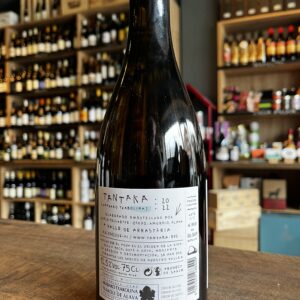
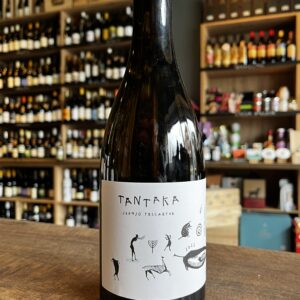 Tantaka is a white wine aged on lees made with the Hondarribi Zuri variety in the D.O. Arabako-txakolina (Basque Country) by Juanjo Tellaetxe. Juanjo Tellaetxe which happens to be a priest and a shepherd made his dream a reality when he implemented his work philosophy in the Arrastaria Valley vineyards (Álava) to make honest wines with a strong local character. To do that, the Tantaka winery is committed to using native varieties, cultivated in an environmentally-respectful way and with minimum intervention in the winery. The soils are characterised by their alluvial and semi-deep character, with a climate that ranges from Atlantic to continental, depending on the vintage Pair it with seafood, baked fish, vegetables and pork.
Tantaka is a white wine aged on lees made with the Hondarribi Zuri variety in the D.O. Arabako-txakolina (Basque Country) by Juanjo Tellaetxe. Juanjo Tellaetxe which happens to be a priest and a shepherd made his dream a reality when he implemented his work philosophy in the Arrastaria Valley vineyards (Álava) to make honest wines with a strong local character. To do that, the Tantaka winery is committed to using native varieties, cultivated in an environmentally-respectful way and with minimum intervention in the winery. The soils are characterised by their alluvial and semi-deep character, with a climate that ranges from Atlantic to continental, depending on the vintage Pair it with seafood, baked fish, vegetables and pork. -
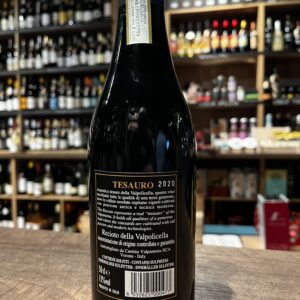
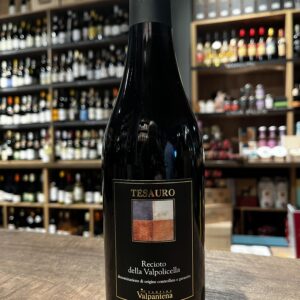 The Torre del Falasco wines are the standard bearers of this co-operative, situated in the Valpantena, northeast of Verona. Known as the ’valley of god’ to the ancient Greeks, this area is well-known for its high quality red wines, due partly to the soils but also because of the cool breeze that blows down the valley from the foothills of the Dolomites. Cantina Valpantena Tesauro Recioto della Valpolicella is the perfect dessert wine and pairs well with chocolate, cheese, and other sweet treats. With its unique blend of grapes and traditional winemaking techniques, this wine is sure to impress even the most discerning of wine lovers.
The Torre del Falasco wines are the standard bearers of this co-operative, situated in the Valpantena, northeast of Verona. Known as the ’valley of god’ to the ancient Greeks, this area is well-known for its high quality red wines, due partly to the soils but also because of the cool breeze that blows down the valley from the foothills of the Dolomites. Cantina Valpantena Tesauro Recioto della Valpolicella is the perfect dessert wine and pairs well with chocolate, cheese, and other sweet treats. With its unique blend of grapes and traditional winemaking techniques, this wine is sure to impress even the most discerning of wine lovers. -
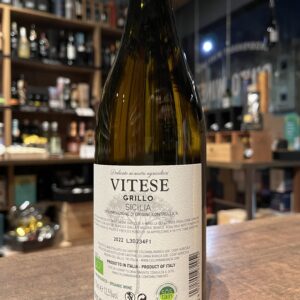
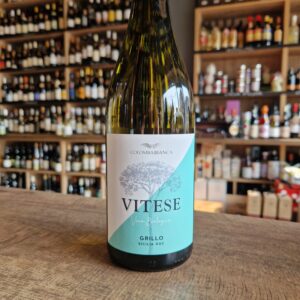 The Colomba Bianca winery was founded in 1970. During the last 10 years, under the guidance of our Chairman Leonardo Taschetta, it has become the biggest wine growing co-operative in Sicily. The company today, can, in fact, count on circa 2480 partners and extends along 7500 hectars of vineyards between the provinces of Trapani, Palermo, Agrigento, Caltanissetta e Ragusa, with 5 wineries distributed in the whole territory. The vineyards can be found in areas which benefit of a vast pedoclimatic diversity, from the low coastal areas up to an altitude of 600 metres above sea level. "We work with the aim that our farmers receive the right compensation for their work. This adds dignity to Sicilian agriculture and to the wines which express at best our territory. It is for this reason that each one of our wines is dedicated to our farmers." - Colomba Bianco Grillo is the flagship of Sicily's indigenous white varieties. Famous for its role in the production of Marsala wines, but has recently come into its own as a varietal making light, fresh and citrussy wines. Ideal with fish first courses, delicate risottos and white meat dishes.
The Colomba Bianca winery was founded in 1970. During the last 10 years, under the guidance of our Chairman Leonardo Taschetta, it has become the biggest wine growing co-operative in Sicily. The company today, can, in fact, count on circa 2480 partners and extends along 7500 hectars of vineyards between the provinces of Trapani, Palermo, Agrigento, Caltanissetta e Ragusa, with 5 wineries distributed in the whole territory. The vineyards can be found in areas which benefit of a vast pedoclimatic diversity, from the low coastal areas up to an altitude of 600 metres above sea level. "We work with the aim that our farmers receive the right compensation for their work. This adds dignity to Sicilian agriculture and to the wines which express at best our territory. It is for this reason that each one of our wines is dedicated to our farmers." - Colomba Bianco Grillo is the flagship of Sicily's indigenous white varieties. Famous for its role in the production of Marsala wines, but has recently come into its own as a varietal making light, fresh and citrussy wines. Ideal with fish first courses, delicate risottos and white meat dishes. -
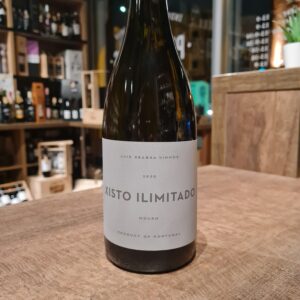 Another under the radar Portuguese White. This drop is now considered one of the new best contemporanean whites in Portugal. Produced by Luis Seabra, who worked for more than 10 years as an oenologist for Dirk Niepoort and finally started to follow his own path in 2012. The name he gives to his wines is indicative of his vision of wine: Xisto (Schist). He makes very pure wines that reflect their terroir. Luis Seabra sets a new standard in the Douro with his pure wines. Xisto Ilimitado, is a Portuguese analogue of the idea of a "village-level" Burgundy. A blend of six varieties planted in three sub-areas of the Douro, Ilimitado is a glimpse of the appellation's schist soil. Luis Seabra, has concentrated his production on the different soil types of the valley. Bright, concentrated and fresh, Xisto Ilimitado is an excellent introduction to the new Douro. Vineyards located in Cima Corgo. The vines are between 30 and 45 years old, planted in micaceous schist at an altitude of 500 to 600 m, and are a sub-region that experiences extreme highs and lows in terms of temperature, with one of the largest day-night temperature deltas in Portugal. As such, the fruit experiences an extended resting period. Annual rainfall of 400 mm typical of the region. Goes wonderfully with roasted poultry, white fish and seafood, and especially with the spiciest preparations
Another under the radar Portuguese White. This drop is now considered one of the new best contemporanean whites in Portugal. Produced by Luis Seabra, who worked for more than 10 years as an oenologist for Dirk Niepoort and finally started to follow his own path in 2012. The name he gives to his wines is indicative of his vision of wine: Xisto (Schist). He makes very pure wines that reflect their terroir. Luis Seabra sets a new standard in the Douro with his pure wines. Xisto Ilimitado, is a Portuguese analogue of the idea of a "village-level" Burgundy. A blend of six varieties planted in three sub-areas of the Douro, Ilimitado is a glimpse of the appellation's schist soil. Luis Seabra, has concentrated his production on the different soil types of the valley. Bright, concentrated and fresh, Xisto Ilimitado is an excellent introduction to the new Douro. Vineyards located in Cima Corgo. The vines are between 30 and 45 years old, planted in micaceous schist at an altitude of 500 to 600 m, and are a sub-region that experiences extreme highs and lows in terms of temperature, with one of the largest day-night temperature deltas in Portugal. As such, the fruit experiences an extended resting period. Annual rainfall of 400 mm typical of the region. Goes wonderfully with roasted poultry, white fish and seafood, and especially with the spiciest preparations


